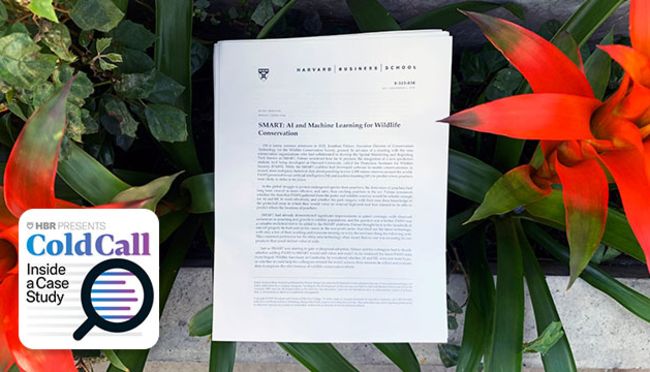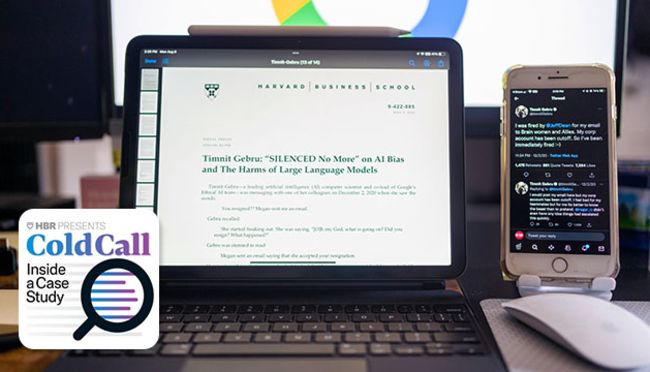
- 09 Jan 2024
- In Practice
Harnessing AI: What Businesses Need to Know in ChatGPT’s Second Year
Companies across industries rushed to adopt ChatGPT last year, seeing its potential to streamline tasks formerly handled by people and vendors at much higher cost. As generative AI enters its next phase in 2024, what can leaders expect? Harvard Business School faculty members highlight four trends to watch.

- 22 Nov 2023
- Research & Ideas
Humans vs. Machines: Untangling the Tasks AI Can (and Can't) Handle
Are you a centaur or a cyborg? A study of 750 consultants sheds new light on the strengths and limits of ChatGPT, and what it takes to operationalize generative AI. Research by Edward McFowland III, Karim Lakhani, Fabrizio Dell'Acqua, and colleagues.

- 19 Sep 2023
- HBS Case
How Will the Tech Titans Behind ChatGPT, Bard, and LLaMA Make Money?
It seems like anything is possible with generative AI right now. But how will companies profit from those big ideas? Andy Wu breaks down the potentially painful tradeoffs that tech firms might face as artificial intelligence enters its next phase.

- 03 May 2023
- Research & Ideas
Why Confronting Racism in AI 'Creates a Better Future for All of Us'
Rather than build on biased data and technology from the past, artificial intelligence has an opportunity to do better, says Business in Global Society Fellow Broderick Turner. He highlights three myths that prevent business leaders from breaking down racial inequality.

- 14 Mar 2023
- Cold Call Podcast
Can AI and Machine Learning Help Park Rangers Prevent Poaching?
Globally there are too few park rangers to prevent the illegal trade of wildlife across borders, or poaching. In response, Spatial Monitoring and Reporting Tool (SMART) was created by a coalition of conservation organizations to take historical data and create geospatial mapping tools that enable more efficient deployment of rangers. SMART had demonstrated significant improvements in patrol coverage, with some observed reductions in poaching. Then a new predictive analytic tool, the Protection Assistant for Wildlife Security (PAWS), was created to use artificial intelligence (AI) and machine learning (ML) to try to predict where poachers would be likely to strike. Jonathan Palmer, Executive Director of Conservation Technology for the Wildlife Conservation Society, already had a good data analytics tool to help park rangers manage their patrols. Would adding an AI- and ML-based tool improve outcomes or introduce new problems? Harvard Business School senior lecturer Brian Trelstad discusses the importance of focusing on the use case when determining the value of adding a complex technology solution in his case, “SMART: AI and Machine Learning for Wildlife Conservation.”

- 07 Mar 2023
- HBS Case
ChatGPT: Did Big Tech Set Up the World for an AI Bias Disaster?
Google tried to silence AI bias warnings from ethicist Timnit Gebru. Will a world enamored with OpenAI's ChatGPT be able to confront them? Tsedal Neeley reflects on Gebru's experience in a case study, and offers advice on managing the ethical risks of AI.

- 16 Dec 2022
- Research & Ideas
Why Technology Alone Can't Solve AI's Bias Problem
Engineers designed "fair-ranking algorithms" to prevent artificial intelligence from marginalizing certain groups. While these tools help, research by Himabindu Lakkaraju finds that they can't completely override the most stubborn source of bias: people.

- 09 Aug 2022
- Cold Call Podcast
A Lesson from Google: Can AI Bias be Monitored Internally?
Dr. Timnit Gebru was the co-lead of Google’s Ethical AI research team—until she raised concerns about bias in the company’s large language models and was forced out in 2020. Her departure sent shockwaves through the AI and tech community and raised fundamental questions about how companies safeguard against bias in their own AI. Should in-house ethics research continue to be led by researchers who best understand the technology, or must ethics and bias be monitored by more objective researchers who aren’t employed by companies? Professor Tsedal Neeley discusses how companies can approach the problem of AI bias in her case, “Timnit Gebru: 'SILENCED No More' on AI Bias and The Harms of Large Language Models.”

- 15 Sep 2020
- Working Paper Summaries
Time and the Value of Data
This paper studies the impact of time-dependency and data perishability on a dataset's effectiveness in creating value for a business, and shows the value of data in the search engine and advertisement businesses perishes quickly.

- 23 Mar 2020
- Working Paper Summaries
The Effects of Hierarchy on Learning and Performance in Business Experimentation
Do senior managers help or hurt business experiments? Analyzing a dataset of more than 6,300 experiments on the A/B/n testing platform Optimizely, this study suggests that involving senior executives in experimentation teams can have surprising consequences.

- 28 Nov 2018
- HBS Case
On Target: Rethinking the Retail Website
Target is one big-brand retailer that seems to have survived and even thrived in the apocalyptic retail landscape. What's its secret? Srikant Datar discusses the company's relentless focus on online data. Open for comment; 0 Comments.
- 13 Feb 2017
- Research & Ideas
Paid Search Ads Pay Off for Lesser-Known Restaurants
Researchers Michael Luca and Weijia Dai wanted to know if paid search ads pay off for small businesses such as restaurants. The answer: Yes, but not for long. Open for comment; 0 Comments.

- 28 Feb 2013
- Working Paper Summaries
Do Display Ads Influence Search? Attribution and Dynamics in Online Advertising
The introduction of online metrics such as click through rate (CTR) and cost per acquisition (CPA) by Google and other online advertisers has made it easy for marketing managers to justify their online ad spending in comparison to the budgets used for television and other media. However, these metrics suffer from two fundamental problems: (a) they do not account for attribution, since they give credit to the last click and ignore the impact of other ad formats that may have helped a consumer move down the conversion funnel, and (b) they ignore the dynamics, since they only account for the immediate impact of ads. As firms spend more of their ad dollars on online search and display, managers and researchers alike recognize a need for more careful attribution adjustment that takes into account the journey consumers follow before conversion as well as account for the impact of ads over time. In this paper, the authors use time series models to infer the interaction between search and display ads and also capture their impact over time. Examining data from a bank that used online advertising to acquire new customers for its checking account, the authors found that display ads have a significant impact on search applications, as well as clicks. The majority of this spillover was not instant, but took effect only after two weeks. On the other hand, search advertising did not lead to an increase in display applications. However, search ads showed significant dynamic effects on search applications that made them very cost effective in the long run. Key concepts include: Classic metrics used in practice are highly biased since they do not account for the effects documented in this study. As a result, firms may be making suboptimal budget allocation decisions. Managers should carefully consider the interaction and dynamic effects of search and display advertising. In the study, revised measures of ad effectiveness lead to a very different budget allocation than the one used currently by the firm. Even though the proposed allocation gives credit to display due to its effect on search applications, the search ad budget should be increased by 36% from its current level due to its strong dynamic effects. The display ad budget should be decreased by 31%. Closed for comment; 0 Comments.

How Humans Outshine AI in Adapting to Change
Could artificial intelligence systems eventually perform surgeries or fly planes? First, AI will have to learn to navigate shifting conditions as well as people do. Julian De Freitas and colleagues pit humans against machines in a video game to study AI's current limits and mine insights for the real world.